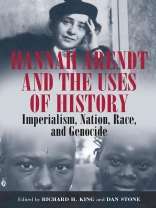Hannah Arendt (1906-1975) first argued that there were continuities between the age of European imperialism and the age of fascism in Europe in The Origins of Totalitarianism (1951). She claimed that theories of race, notions of racial and cultural superiority, and the right of ‘superior races’ to expand territorially were themes that connected the white settler colonies, the other imperial possessions, and the fascist ideologies of post-Great War Europe. These claims have rarely been taken up by historians. Only in recent years has the work of scholars such as Jürgen Zimmerer and A. Dirk Moses begun to show in some detail that Arendt was correct.
This collection does not seek merely to expound Arendt’s opinions on these subjects; rather, it seeks to use her insights as the jumping-off point for further investigations – including ones critical of Arendt – into the ways in which race, imperialism, slavery and genocide are linked, and the ways in which these terms have affected the United States, Europe, and the colonised world.
İçerik tablosu
Introduction
Richard H. King and Dan Stone
PART I: IMPERIALISM AND COLONIALISM
Chapter 1. Race Power, Freedom, and the Democracy of Terror in German Racialist Thought
Elisa von Joeden-Forgey
Chapter 2. Race Thinking and Racism in Hannah Arendt’s The Origins of Totalitarianism
Kathryn T. Gines
Chapter 3. When the Real Crime Began: Hannah Arendt’s The Origins of Totalitarianism and the Dignity of the Western Philosophical Tradition
Robert Bernasconi
Chapter 4. Race and Bureaucracy Revisited: Hannah Arendt’s Recent Re-Emergence in African Studies
Christopher J. Lee
Chapter 5. On Pain of Extinction: Laws of Nature and History in Darwin, Marx, and Arendt
Tony Barta
PART II: NATION AND RACE
Chapter 6. The Refractory Legacy of Decolonization: Revisiting Arendt on Violence
Ned Curthoys
Chapter 7. Anti-Semitism, the Bourgeoisie, and the Self-Destruction of the Nation-State
Marcel Stoetzler
Chapter 8. Eichmann’s Mentality and Post-totalitarian Predicaments
Vlasta Jalušiè
PART III: INTELLECTUAL GENEALOGIES AND LEGACIES
Chapter 9. Hannah Arendt on Totalitarianism: Moral Equivalence and Degrees of Evil in Modern Political Violence
Richard Shorten
Chapter 10. Hannah Arendt, Biopolitics, and the Problem of Violence
Andre Duarte
Chapter 11. The ‘Subterranean Stream of Western History
Robert Eaglestone
Chapter 12. Hannah Arendt and the Old ‘New Science’
Steven Douglas Maloney
Chapter 13. The Holocaust and ‘the Human’
Dan Stone
Conclusion: Arendt between Past and Future
Richard H. King
Bibliography
Contributors
Index
Yazar hakkında
Dan Stone is Professor of Modern History at Royal Holloway, University of London. He is the author of Breeding Superman: Nietzsche, Race and Eugenics in Edwardian and Interwar Britain (2002), Constructing the Holocaust: A Study in Historiography (2003), and Responses to Nazism in Britain, 1933-39: Before the War and Holocaust (2003).












